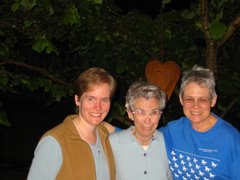 The Math Gene: How Mathematical Thinking Evolved & Why Numbers Are Like Gossip by Keith Devlin
The Math Gene: How Mathematical Thinking Evolved & Why Numbers Are Like Gossip by Keith DevlinMy review
rating: 2 of 5 stars
Devlin gives a hypothesis about how mathematical thinking evolved. He claims that the capacity for mathematical thinking is the same as the capacity for language (i.e., syntax), since syntactical thinking allows us to think "off-line" about objects, concepts, plans that are not in our immediate environment. Off-line thinking may be stimulated by non-environmental cues (e.g., thoughts), whereas on-line thinking is always stimulated by the immediate environment. Off-line thinking allows us to think about abstract ideas or objects, necessary for mathematical thinking.
Devlin also claims that doing math is like watching (or creating) a soap opera - it is all about relationships, but between mathematical objects instead of people. He likens mathematics to gossip.
Devlin's theories sound plausible to me, and it certainly seems that language and abstract thinking are related. It is interesting to read someone's ideas of exactly how they might be related. He gets into linguistics and archeology, too. It is also good to see someone describe, or attempt to describe, mathematical thinking for people who dislike or simply don't do math. I think this would be a worthwhile book for teachers of school math (arithmetic especially), since Devlin describes why arithmetic is difficult (his theory) and how it differs from true math. Anyone interested in math education should read it since it relates math to language and gossip, etc. Lots of good information, or at least some interesting ideas.
I don't like the way the book is written, however, neither the organization nor the writing style. For a mathematician, Devlin does not produce a neat, clean argument, although all the pieces may be there. He spends too much time saying what he will say and what he has said, and drags out what he says with extra words. Not concise. Maybe his publisher or editor wanted a long book. If one can get past the writing, organization, and repeated plugs for his other books, though, one will find an interesting, worthwhile theory.
View all my reviews.


1 comment:
That does sound pretty interesting, man. That kind of stuff is stuff I think about a lot, cuz I always wonder what form thought takes when yer a baby, before you develop the logico-rational-word-using-problem-solving part of the mind. I always wonder about that, but since I've evolved my very own logico-rational-word-usin'-problem-solving-part-of-the-brain, it's hard to see past that form o' thinkin', man. Hard, indeed.
Post a Comment